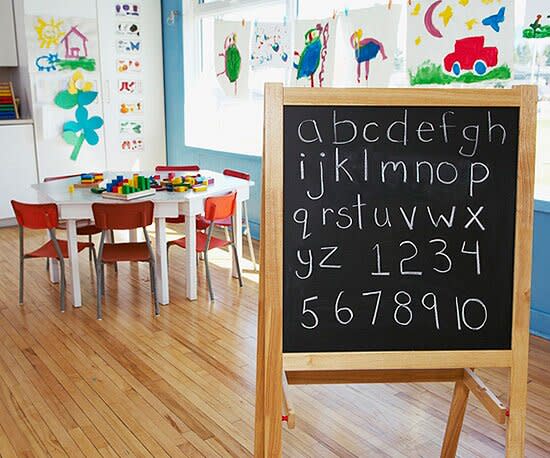How to Help a Hearing-Impaired Child at School

Fancy Photography/ Veer
More than 70,000 children in public schools receive services to help with hearing in the classroom, according to the American Speech-Language-Hearing Association (ASHA). "These services are critical because children learn to talk by listening to other people talk," explains Jillian Kimberlain, Au.D., CC-A, an audiologist at Arkansas Children's Hospital. As a result, children who are hard of hearing can find it much more difficult to learn vocabulary, grammar, word order, and other aspects of verbal communication. They also struggle with reading and mathematical concepts, perhaps because they tend to have difficulty understanding complex sentence structures and words with multiple meanings. Without the right support, these kids tend to fall behind their peers with normal hearing.
But there is plenty of good news: Children with hearing loss who do receive good language access from an early age are usually able to develop spoken or signed language, or both, on par with their hearing classmates. "Nobody can predict the future and every child develops differently," says Cheryl Edwards, an audiologist and interim director of diagnostic audiology at Boston Children's Hospital. "But with the right support, there is no reason why a deaf child can't thrive at school." Here's how to make sure your child gets what he needs.
Start Early
A baby with hearing loss will qualify for your state's early intervention program, which coordinates speech-language and other therapies for children with special needs aged birth to 3. Go to earlyinterventionsupport.com and scroll down to Finding Help, or contact your state or county department of public health to find out which services are available in your area. In most states, early intervention services are completely free, and therapists will come to your home to work with your infant or toddler. Your Early Intervention program should also be able to help connect you with a preschool or day-care center that is equipped to work with your child once he turns 3.
Know Your Child's Needs
By the time your child goes to school, you will be an expert on what works and doesn't work for her, so don't be afraid to share those tips with her teacher. For example, most kids with hearing loss don't hear well if their back is turned to the speaker, especially in noisy classrooms, so teachers should get in the habit of catching their attention visually before speaking. "Always remember that you know your child best and that makes you his most important advocate," Edwards notes. "Many teachers just haven't had the opportunity to work with a child who is hard of hearing before and they will welcome your input on how to best meet his needs."
Put a Hearing Specialist on the Team
Advocating for your child's needs is hard, emotionally draining work, so make sure you have an expert on your side. "You want someone else on your team who knows exactly what your child needs and can advocate for him in the classroom," Edwards says. "A good educational audiologist or teacher of the deaf will help work with classroom staff to make sure they understand any potential issues and accommodations that need to be made." This can involve pinpointing the necessary therapies or classroom accommodations, as well as recommending and training teachers to use hearing amplification systems for your child's benefit. (With most hearing amplification systems, the teacher will wear a microphone that connects to a classroom-wide speaker system or wirelessly to your child's hearing aid.) Your child's pediatrician, ENT doctor, primary audiologist, or Early Intervention coordinator can help you find such a person if your school district does not already employ one.
Get a Plan in Place
Once your child is school age, you will need to meet with her teachers, audiologist, and other school staff to come up with an Individualized Education Plan (IEP) so she can receive speech-language therapy and any other necessary services during the school day. If hearing loss is mild, your child may not need special academic services but could still use certain communication accommodations in the classroom (such as always being seated near the teacher). In that case, your school will put together a Section 504 plan, to ensure those accommodations are put into place.
Know Your Rights
You aren't getting a favor or special treatment when you ask a teacher to use a hearing amplification system or to make sure your child sits in the front row; he's legally entitled to such arrangements. In fact, federal law requires schools to provide all students with access to the educational environment and to incorporate accommodations and modifications for students who need them, and federal special education laws have supported the need for audiology services in schools for more than 30 years. So don't be shy. ASHA (asha.org/public) and the American Society for Deaf Children (deafchildren.org) are two good resources for more information about your child's needs and rights in the classroom.
Copyright © 2014 Meredith Corporation.
All content on this Web site, including medical opinion and any other health-related information, is for informational purposes only and should not be considered to be a specific diagnosis or treatment plan for any individual situation. Use of this site and the information contained herein does not create a doctor-patient relationship. Always seek the direct advice of your own doctor in connection with any questions or issues you may have regarding your own health or the health of others.
